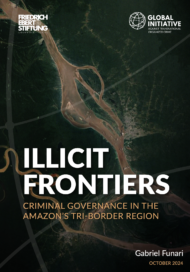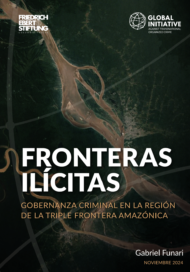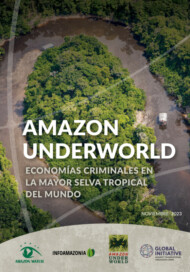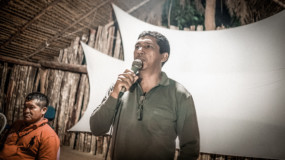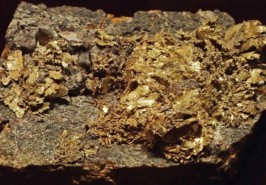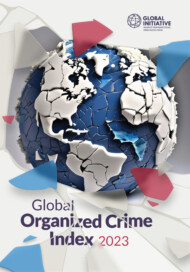Transnational organized crime has turned cities of the Amazon region like Leticia (Colombia) and Tabatinga(Brazil) into strategic hubs for criminal governance. Historically used as logistical stopovers for drug trafficking, these cities now serve as permanent bases for criminal groups, such as Brazil’s Comando Vermelho (CV) and the Primeiro Comando da Capital (PCC) that participate in a variety of criminal markets in the rainforest region.
Criminal disputes over the local illicit ecosystem have transformed Leticia and Tabatinga into some of the most violent urban centers in the Americas. Tabatinga registered a staggering homicide rate of 95.9 per 100,000 people in 2023, while Leticia recorded 31.4, making them critical points of concern for regional security. The report emphasizes the connections between urban criminal governance and environmental destruction, with organized crime now being a key player in driving deforestation and biodiversity loss in the Amazon. The CV currently holds the ascendancy in Leticia and Tabatinga. The group oversees a wide range of illicit activities in the area, including drug trafficking, wildlife smuggling, and illegal gold mining.
The report stresses that understanding the urban dynamics of the Amazon is essential not only for tackling organized crime, but also for global conservation efforts. The study calls for cross-border cooperation and intelligence sharing between Brazil, Colombia, and Peru. Furthermore, greater government support for violence reduction programs that revolve around career mentorship for local youth and drug rehabilitation initiatives are essential for reducing the influence of criminal organizations on local communities.
This publication marks the debut of GI-TOC’s Observatory of Illicit Economies in the Amazon Basin (Amazon-Obs) in its mission to support governments, media, and researchers in addressing transnational crime in this critical region.
El crimen organizado transnacional ha convertido a ciudades de la región amazónica como Leticia (Colombia) y Tabatinga (Brasil) en puntos estratégicos para la gobernanza criminal. Estas ciudades, que históricamente habían sido paradas logísticas para el tráfico de drogas, ahora funcionan como bases permanentes de grupos delictivos como el Comando Vermelho (CV) y el Primeiro Comando da Capital (PCC) de Brasil, los cuales operan en diversos mercados ilícitos en la región.
Las disputas entre organizaciones criminales por el control del ecosistema ilícito local han hecho de Leticia y Tabatinga dos de las ciudades más violentas de América. En 2023, Tabatinga registró una impactante tasa de homicidios de 95,9 por cada 100.000 habitantes, mientras que Leticia alcanzó 31,4, convirtiéndolas en puntos clave de preocupación para la seguridad regional. Este informe destaca cómo la gobernanza criminal urbana está estrechamente ligada a la destrucción ambiental, ya que el crimen organizado es ahora un motor principal de la deforestación y la pérdida de biodiversidad en el Amazonas. Actualmente, el CV domina en Leticia y Tabatinga, controlando actividades ilícitas como el tráfico de drogas, el contrabando de fauna silvestre y la minería ilegal de oro.
El documento subraya la importancia de comprender las dinámicas urbanas de la Amazonía, no solo para combatir el crimen organizado, sino también para fortalecer los esfuerzos globales de conservación. Además, hace un llamado a una mayor cooperación entre Brasil, Colombia y Perú, mediante el intercambio de inteligencia y acciones conjuntas. También destaca la necesidad de más apoyo gubernamental a programas que busquen reducir la violencia, ofreciendo oportunidades laborales para los jóvenes y reforzando iniciativas de rehabilitación para personas con problemas de adicción, como estrategias clave para debilitar la influencia de las organizaciones criminales en las comunidades locales.
Esta publicación marca el lanzamiento del Observatorio de Economías Ilícitas en la Cuenca Amazónica (Amazon-Obs) de GI-TOC, cuya misión es apoyar a gobiernos, medios de comunicación e investigadores en la lucha contra el crimen transnacional en esta región crítica.
Fronteiras ilícitas: Governança criminal na região da tríplice fronteira amazônica
O crime organizado transnacional transformou cidades da região amazônica, como Leticia (Colômbia) e Tabatinga (Brasil), em pontos estratégicos para a governança criminosa. Essas cidades, que historicamente foram paradas logísticas para o tráfico de drogas, agora funcionam como bases permanentes de grupos criminosos, como o Comando Vermelho (CV) e o Primeiro Comando da Capital (PCC) do Brasil, que operam em diversos mercados ilícitos na região.
As disputas entre organizações criminosas pelo controle do ecossistema ilícito local fizeram de Leticia e Tabatinga duas das cidades mais violentas das Américas. Em 2023, Tabatinga registrou uma chocante taxa de homicídios de 95,9 por 100 mil habitantes, enquanto Leticia alcançou 31,4, tornando-as pontos críticos de preocupação para a segurança regional. Este relatório destaca como a governança criminosa urbana está intimamente ligada à destruição ambiental, uma vez que o crime organizado se tornou um dos principais motores do desmatamento e da perda de biodiversidade na Amazônia. Atualmente, o CV domina Leticia e Tabatinga, controlando atividades ilícitas como o tráfico de drogas, o contrabando de animais silvestres e a mineração ilegal de ouro.
O documento enfatiza a importância de compreender as dinâmicas urbanas da Amazônia, não apenas para combater o crime organizado, mas também para fortalecer os esforços globais de conservação. Além disso, faz um apelo por uma maior cooperação entre Brasil, Colômbia e Peru, por meio da troca de inteligência e ações conjuntas. Também destaca a necessidade de mais apoio governamental a programas que busquem reduzir a violência, oferecendo oportunidades de trabalho para jovens e fortalecendo iniciativas de reabilitação para pessoas com problemas de dependência, como estratégias fundamentais para enfraquecer a influência das organizações criminosas nas comunidades locais.
Esta publicação marca o lançamento do Observatório de Economias Ilícitas na Bacia Amazônica (Amazon-Obs) da GI-TOC, cuja missão é apoiar governos, meios de comunicação e pesquisadores na luta contra o crime transnacional nesta região crítica.
